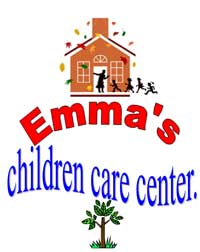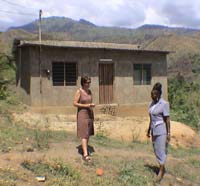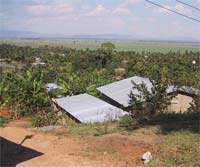
| - | Main Page |
| - | Background |
| - | Bi-laws |
| - | Presentations |
| - | Accounts |
| - | Support to ECCC |
| - | Stories |
| - | Company contributions |
|
|
The story about Emma's Children Care Center |
| In connection with
the development aid funded rehabilitation project of Kidatu
power plant in Tanzania, co-finances by Sida & NORAD, many
Sweeds and Norwegians have regularly visited Kidatu since the
early 19'ties and almost permanently since the summer of 1999.
During this period a good relation arised between the local
and foreign population and it was therefore a natural thing to
leave behind in 2003 when the project was almost compleeted. Emmaculata. The whole began the day the first Norwegianm, Harald Aspeholen, arrived Kidatu. He had not been long at his house before he heard a soft knock on his door and became aware of two shy young girls. They giggled and delivered a smaal tiny handwritten note of papir and disappared again just as fast as they appreared. The handwritten note was written in poor English and was a polite request for a job. One of them was named Emmaculata, and was educated mechanical technican. Since there was no work for a girl in Tanzania she had to apply for occational jobs to earn for her living. She and her girl friend Jovita got the job by Harald and it soon proved to be a good choice. The girls was very handy and reliable , dyktige, eager, accurate and at least honnest. Jovita found another job, but Emma worked 5 days a week by Harald, and during the evenings she run a small shop in her parents home. During the week-ends she took the bucysle and traveld across the Kilombero flats to dig her two small farms at about 40 decar. She farmed both rice, mais & sugar, but this entailed much work and the income was scarceand fluctuated with the crops and prices and proved less profitable. During the 5 years Emma worked for Harald, she managed to construct her own lithle home for the salary she got. She bought a lithle flat upon a hiltop near to the village. She did also build a small annex for rent. The income was ment for education for her lithle daughter Happy. The income, however, was scarse and unreliable, and during the first years she only rented 1 room. In 2001 Emma lost both her parents and thereby she got the responsibility for her younger couzins. Her elder brother had nothing to contribute with. When Emma moved up to the new house the problems with mlaria decreased compared to the living aside of the wetlands. In November 2002 Einar & Else
Karine visited Kidatu again when Happy was very iill and it
was uncertain if she would survive. Emma took Happy to a
doctor who detected the illness to be malaria and tyfus. She
got a resepe , but these were very expencive and Emma could
hardly afford them. Happy beame, however, even worce and Emma
had to use all her cash reserves to buy medicines. After
several days Happy did not show any sign of improvements and
it was a question of life or death for her. Else did then call
the Nordic clinic in Dar es Salaam who informed that Happy had
got too strongmedicines and indicated that she was medicine
intocisated. Else then paid for hospital costs and after
reducing the medicines to 1/4 Happy rapidly improved, and
after some weeks she was fresh abd healthy again. |
|




